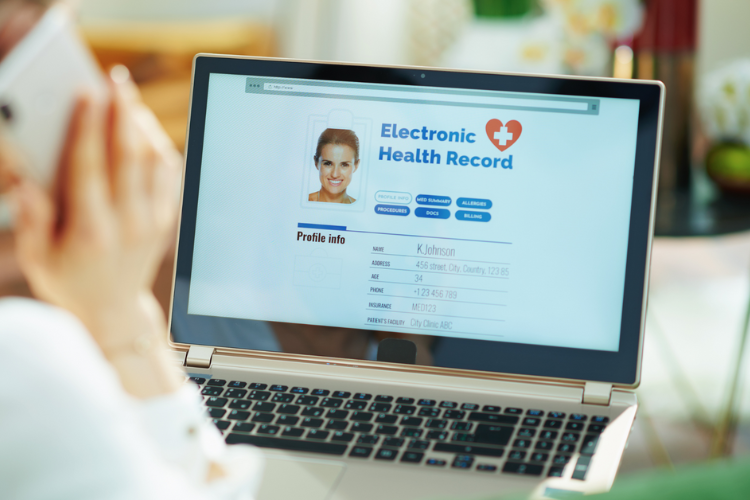
Electronic Health Record (EHR) systems are indispensable tools in healthcare. But what exactly is an EHR system, and why is it so crucial?
This article will break down the importance of EHR systems, how they are used by various healthcare professionals, and the benefits they bring to patient care. By understanding the core functionalities and advantages of EHR systems, healthcare providers can better serve their patients and streamline their operations.
What Is an EHR System?
An Electronic Health Record is a digital version of a patient’s paper chart. It encompasses the comprehensive history of a patient’s health, including diagnoses, treatments, lab results, and medications.
EHRs are sometimes referred to as Electronic Medical Records (EMRs), but EHRs usually provide more features and applications, like billing, telehealth integration, and care coordination.
An EHR system provides real-time, patient-centered records that make information available instantly and securely to authorized users. EHRs are designed to go beyond standard clinical data collection and are inclusive of a broader view of a patient’s care.
Key Features of EHR Systems
EHR systems include several essential features:
-
Patient Demographics: Basic information like age, gender, and contact details. This foundational data is crucial for identifying patients and personalizing their care plans.
-
Clinical Data: Medical history, diagnoses, medications, immunization dates, allergies, lab test results, and radiology images. This comprehensive clinical information aids in accurate diagnosis and effective treatment.
-
Administrative Data: Billing information and insurance details. Streamlined administrative features help in efficient practice management and reduce clerical burdens on healthcare providers.
-
Decision Support: Many EHR systems offer clinical decision support tools that provide reminders for preventive care, flag potential drug interactions, and suggest evidence-based guidelines for treatment.
-
Electronic Prescribing: EHR systems often include e-prescribing capabilities, allowing healthcare providers to send prescriptions directly to pharmacies, reducing errors and improving patient convenience.
Why Are EHR Systems Important?
The move from paper-based records to digital systems was more than just a technological upgrade; it fundamentally transformed how healthcare providers operate and interact with patients. The integration of EHR systems into clinical workflows enhances the quality of care and operational efficiency.
As mentioned above, EHRs can often offer a range of features and applications beyond seamless viewing and distribution of a patient’s medical history.
For example, Healthie is a leading EHR, practice management, and telehealth platform, offering a wide variety of solutions for providers.
Regarding the importance of EHRs in health care delivery, Healthie CEO and co-founder Erica Jain said, “The best healthcare today isn’t delivered on a one-time basis. Rather, providers building long-term relationships with their patients is what actually drives better healthcare outcomes, and that’s what Healthie’s EHR facilitates. Healthie’s EHR was designed for modern healthcare delivery — care that is virtual-first, longitudinal, and collaborative in nature. Practice management features like scheduling, charting, and billing are coupled with patient engagement capabilities like programs, webinars, lifestyle tracking, and more to give clinicians all of the tools they need to deliver the best care possible.”
With that in mind, let’s dive into the variety of ways that EHR systems are important.
Enhanced Patient Care
One of the most significant advantages of EHR systems is the improvement in patient care. With immediate access to a patient’s medical history, healthcare providers can make informed decisions quicker.
This is particularly beneficial in emergency situations where time is of the essence. Additionally, EHR systems facilitate the implementation of best practices and clinical guidelines, ensuring consistent and high-quality care.
Improved Coordination Among Healthcare Providers
EHR systems facilitate better coordination among different healthcare providers. Whether it’s a physician, nurse practitioner, or registered nurse, everyone involved in a patient’s care can access the same up-to-date information.
This reduces the chances of errors and ensures that all providers are on the same page. Enhanced communication tools within EHR systems, such as secure messaging and shared care plans, further support collaborative care.
Increased Efficiency and Productivity
EHR systems streamline administrative tasks like scheduling appointments, billing, and coding. This efficiency allows healthcare providers to focus more on patient care rather than paperwork. It also reduces the need for duplicate tests and procedures, saving both time and resources.
Moreover, automated workflows and integrated practice management features help in optimizing day-to-day operations.
Better Data Security
With regulations like HIPAA (Health Insurance Portability and Accountability Act), data security is a top priority in healthcare.
EHR systems offer robust security features such as encryption, access controls, and audit trails to protect sensitive patient information. Regular updates and compliance checks ensure that the systems meet the latest security standards, safeguarding against potential data breaches.
“The best healthcare today isn’t delivered on a one-time basis. Rather, providers building long-term relationships with their patients is what actually drives better healthcare outcomes, and that’s what Healthie’s EHR facilitates.”
Benefits of EHR Systems
The adoption of EHR systems offers many benefits that extend beyond just individual healthcare providers. These advantages contribute to a more effective, efficient, and patient-centered healthcare system.
Improved Patient Outcomes
With accurate and up-to-date information, healthcare providers can offer more effective treatment plans, leading to better patient outcomes. Some EHR systems offer Clinical Decision Support Systems (CDSS) and predictive analytics to provide alerts, reminders, and evidence-based guidelines to assist providers in making informed decisions.
EHR systems also enable preventive care by identifying risk factors and facilitating early intervention. The ability to track patient data over time supports long-term health management and chronic disease care.
Crucially, EHR systems also facilitate communication among different departments and care teams, ensuring coordinated patient care.
Enhanced Patient Engagement
EHR systems often come with patient portals that allow individuals to access their medical records, schedule appointments, and communicate with their healthcare providers. This increased engagement can lead to better adherence to treatment plans and improved overall health.
Patients empowered with information are more likely to participate actively in their care.
Cost Savings
While the initial investment in an EHR system can be substantial, the long-term savings are significant. Reduced paperwork, fewer duplicated tests, and streamlined billing processes contribute to overall cost savings for healthcare facilities.
Additionally, improved efficiency and reduced administrative burdens translate to more time for patient care and higher patient throughput.
Regulatory Compliance
EHR systems help healthcare providers comply with various regulations, such as HIPAA, by offering features like data encryption and access controls. This ensures that patient information is handled securely and in compliance with the law. Regular system updates and compliance monitoring further support adherence to legal and ethical standards.

Challenges and Considerations
Despite the many benefits, the implementation of EHR systems is not without challenges. Addressing these issues is important for successful adoption and utilization of EHR technology.
Initial Costs
The initial setup cost for an EHR system can be high, including software, hardware, and training expenses. However, the long-term benefits often outweigh these initial investments.
Financial incentives and support programs are available to assist healthcare providers in transitioning to EHR systems.
Training and Adaptation
Adapting to a new EHR system requires training and can be time-consuming. Staff may resist the change, and there is a learning curve involved. Proper training and support can mitigate these challenges. Continuous education and user feedback are essential for optimizing system use and improving user satisfaction.
Ensuring Data Privacy
While EHR systems offer robust security features, data breaches are still a concern.
Healthcare providers must ensure that they are using systems that comply with all regulatory requirements for data security. Regular audits, risk assessments, and incident response plans are necessary to protect patient data effectively.
Conclusion
Electronic Health Records (EHR) systems have revolutionized the way healthcare providers manage patient information. From improving patient care to increasing efficiency and ensuring data security, the benefits of EHR systems are far-reaching. While there are challenges in implementation, the long-term advantages make EHR systems an essential component of modern healthcare.
By embracing this technology, healthcare providers can offer better, more coordinated, and more efficient care to their patients.
So, whether you are a physician or an advanced practice provider, understanding and utilizing your EHR system is crucial for providing the best possible care. The future of healthcare lies in leveraging technology to enhance patient outcomes and operational efficiency.